President of the Syrian Negotiations Commission, Badr Jamous, met with Mr. Alessio Cappellani, Head of the Middle East Division for Egypt, Syria, Lebanon, and Jordan in the EU European External Action Service, to discuss prospects for coordination and cooperation with the European Union on a negotiated political solution in Syria.
President of the Syrian Negotiations Commission, Badr Jamous, met with the German special envoy to Syria, Mr. Stefan Schneck, on Monday to discuss the latest developments in the Syrian political process, Germany’s firm stance on a political solution, and the prospects for advancing the political process.
The Syrian Negotiations Commission met with United Nations Special Envoy to Syria, Mr. Geir Pedersen, and his team in Geneva on Monday. The discussions focused on revitalizing the political process, the role of the United Nations and the Security Council in implementing UN resolutions for a political solution, and establishing binding mechanisms to prevent any party from obstructing the political solution.
At the invitation of the Syrian Negotiations Commission, an expanded meeting convened in Geneva on Tuesday. Attending were the leadership, members, and representatives of the Commission, along with UN envoys and representatives to Syria, and diplomats from Arab and European nations. Also present were representatives from Syrian civil society organizations.
At the invitation of the Syrian Negotiations Commission, a broad meeting was held in Geneva on Tuesday, which included the leadership, members, and representatives of the Commission’s components, international envoys and representatives to Syria, and Arab and European diplomats. Representatives of Syrian civil society organizations also participated.
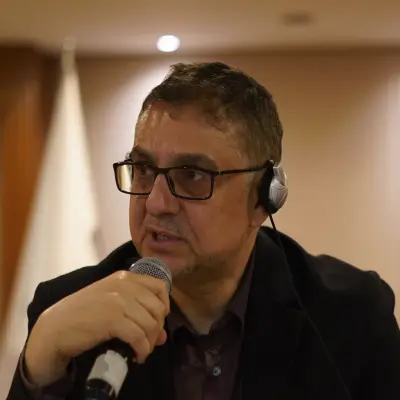
"We observed French willingness to move against the Syrian regime Paris should play a key role in furthering the implementation of a political solution within the UN Security Council."
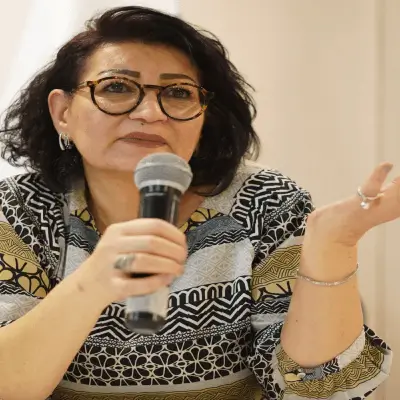
"The step-for-step approach subjects the issue of detainees to political bargaining The use of the detainees file in this political 'bazar' constitutes a complete departure from UNSCR 2254."
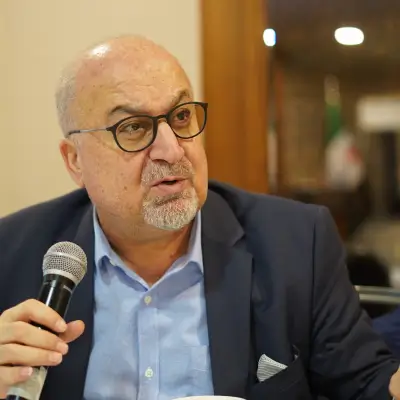
"We discussed the draft elections framework of negotiations The draft includes the outcomes of the years of the work of the elections committee and subject experts on the electoral process with all its dimensions and the relevant constitutional and legal texts.''
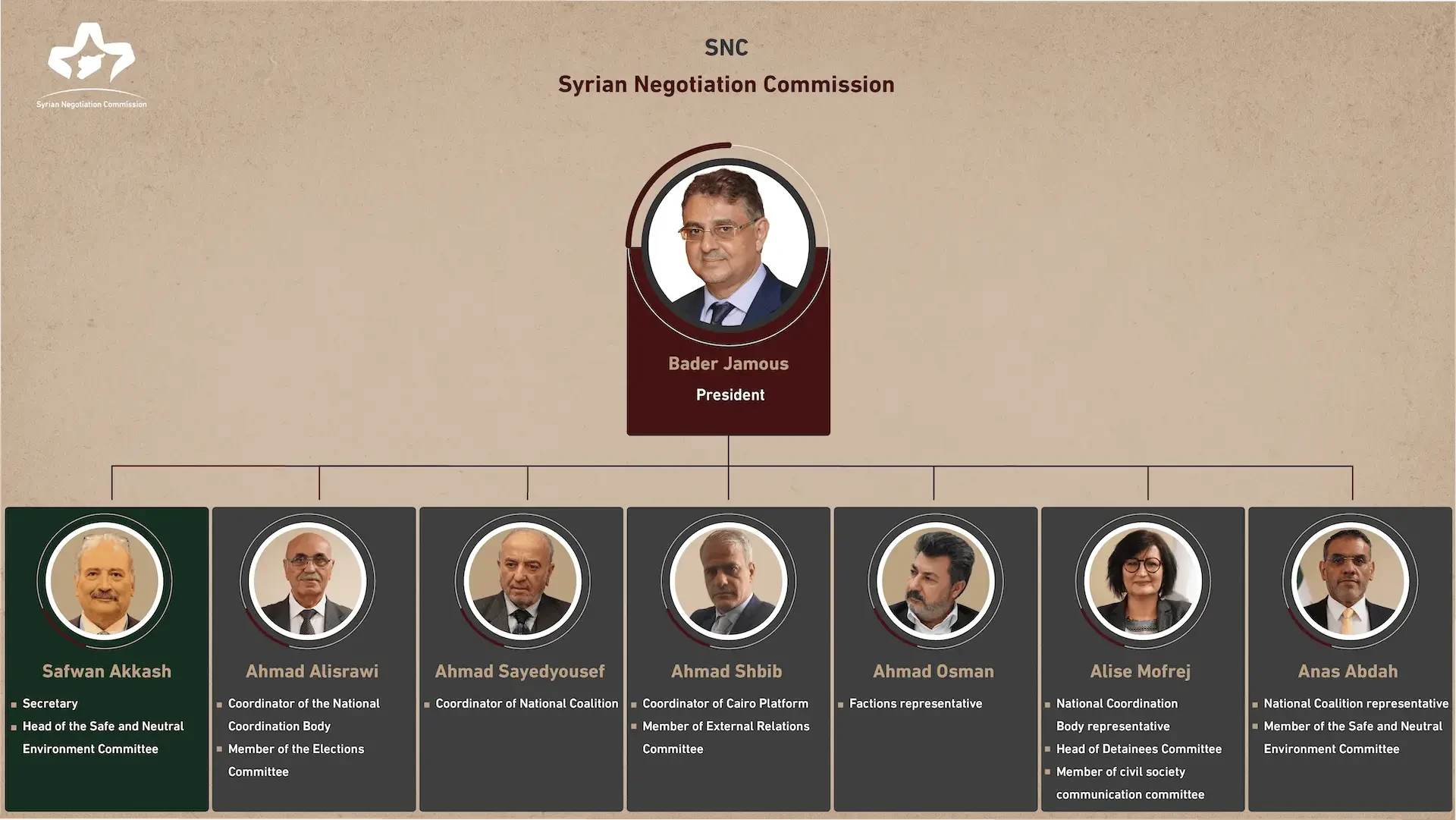
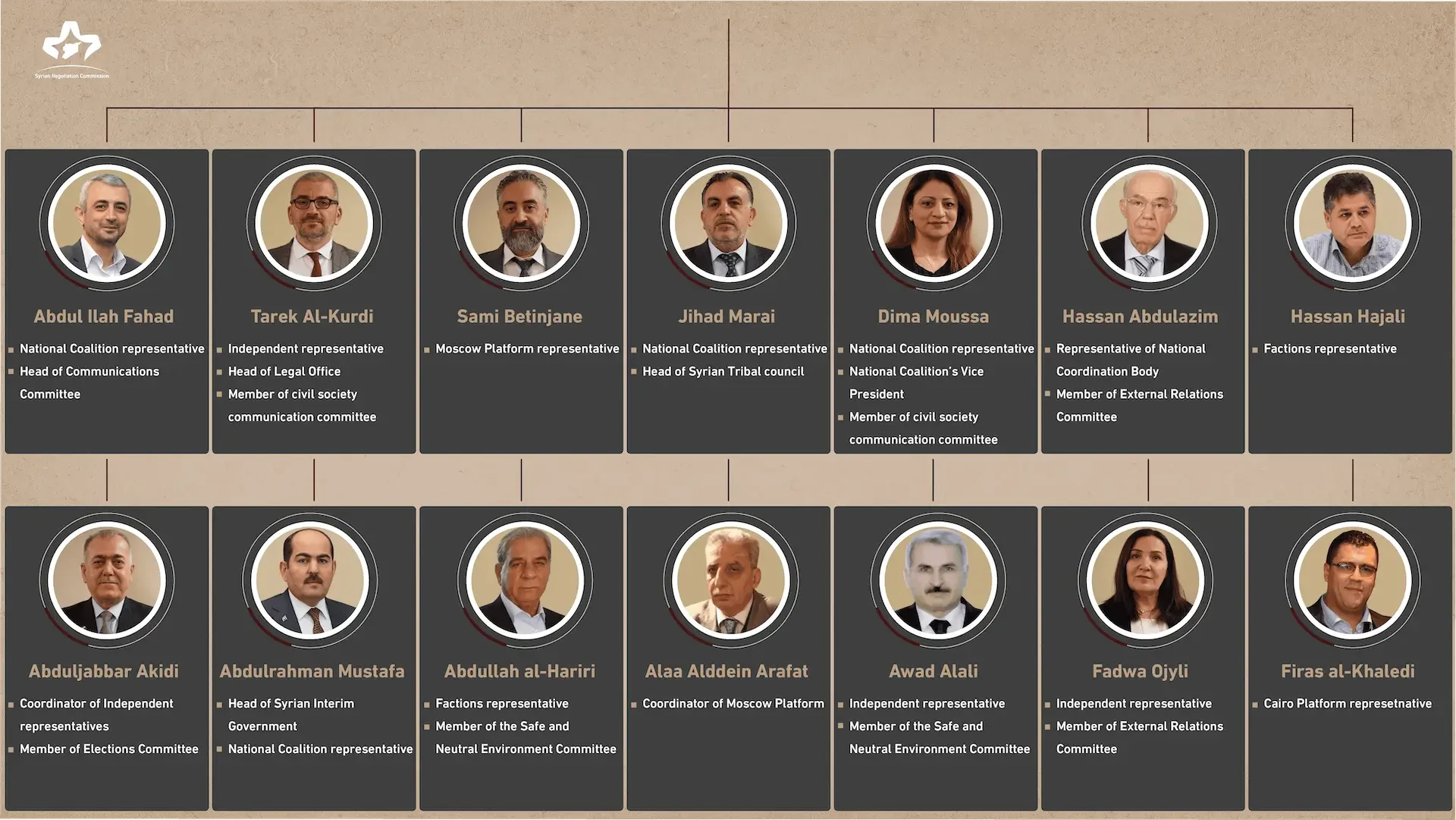
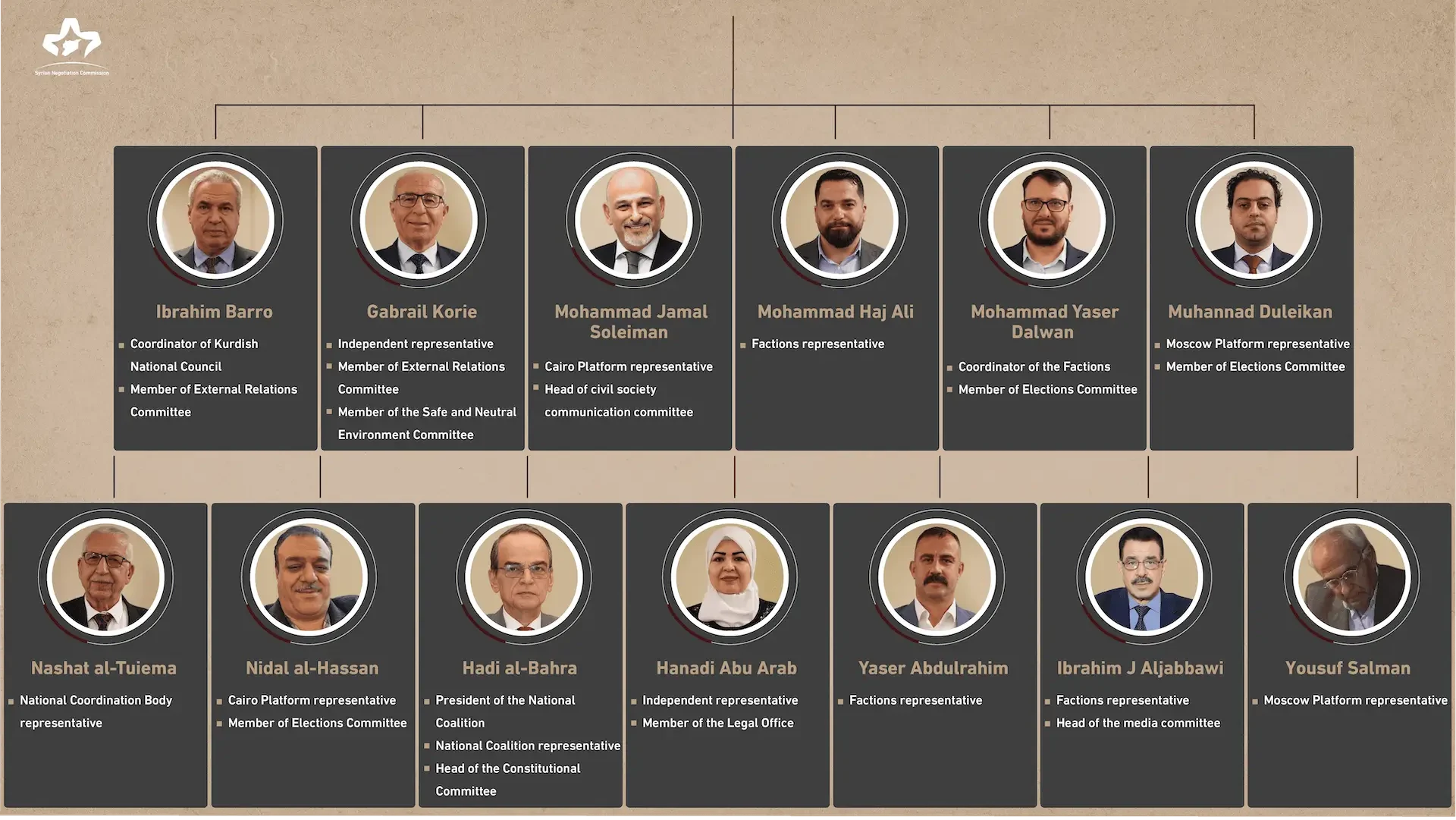
The Syrian Negotiation Commission (SNC) is an umbrella for all forces of the Syrian opposition and it is formally recognized by the United Nations as the sole representative of the Syrian opposition whose mandate is to negotiate with the regime the establishment of a transitional governing body which can secure a safe and neutral environment in which the transitional process can proceed in accordance with international resolutions.
The SNC consists of 37 members representing 7 components:
The National Coalition for Revolution and Opposition Forces:
Establishment: It is a political opposition coalition which was formed in November 2012 following a meeting of a range of Syrian opposition components in Doha. Its main goals include organizing and supporting the revolution, seeking to overthrow the Syrian regime and establish a civil democratic state free of exclusion.
Components: The Coalition consists of 76 members who represent most of the opposition political and revolutionary entities including: provincial councils, the Kurdish National Council, the Turkomen Council, the Syrian National Current, National Future Current, Asyrian Democratic Organization, Muslim Brotherhood, Syrian Tribal Council, Association of Independent Syrian Kurds, independent figures in addition to representatives of military forces.
Principles: The Coalition’s principles include preserving Syria’s national sovereignty and the independence of the Syrian national decision, seeking to overthrow the regime with all its symbols and pillars, dismantling its security apparatus, holding perpetrators of crimes against the Syrian people to account and establishing a civil democratic pluralistic state.
The National Coordination Body for Democratic Change Forces
Establishment: A Syrian opposition assembly consisting of several political parties and independent opposition figures from inside and outside Syria. The Coordination Body was established after a meeting between representatives of some Syrian political parties and independent opposition figure in Damascus countryside in October 2011.
Components: The Coordination Body consists of several leftist Syrian parties, namely: Assyrian Union Party, Socialist Arab Democratic Union, Syrian Communist Labour Party, Syrian Communist Party – Political Bureau, Democratic Socialist Arab Ba’ath Party, Marxist Left Assembly, Together for a Free and Democratic Syria, Kurdish Leftist Party in Syria, Democratic Union Party, Kurdish Democratic Party in Syria, Kurdish Democratic Party in Syria and the Arab Socialists Movement.
Principles: The principles of the Coordination Body include overthrowing the regime with all its symbols, building a democratic system, promoting national unity, asserting the non-violent nature of protests and opposing any form of external intervention.
The Kurdish National Council:
Establishment: The Kurdish National Council was established in October 2011 as a response to the challenge imposed by the PKK-loyal Democratic Union which took over control in Kurdish-majority areas in northern Syria and formed its armed militias and local governance bodies.
Components: The Kurdish National Council is a political coalition comprising 15 parties and factions of Syrian Kurds.
Principles: The principles of the Kurdish National Council include constitutional recognition of the Kurdish national identity, abolishing policies and laws applied on Syrian Kurds, establishing decentralized governance in the framework of Syrian territorial unity, abolishing national, religious or sectarian discrimination and establishing a national secular democratic state for all Syrians.
Cairo Platform:
Establishment: A Syrian assembly which was declared in Egypt in 2014 representing a range of Syrian opposition elements.
Components: Cairo Platform comprises independent figures.
Principles: Cairo Platform supports UNSCR 2254 and Geneva Communique and prioritizes political transition.
Moscow Platform:
Establishment: A Syrian assembly declared in Russia in 2014 representing a range of Syrian opposition elements.
Components: Moscow Platform comprises independent figures.
Principles: Continuing combating terrorism, achieving a political solution through direct negotiations between the government and the opposition represented by one delegation based on consensus and without exclusion.
Military Factions:
Members from the military factions are distributed on various fronts including the southern and northern fronts in addition to representatives of factions affiliated with the Syrian Free Army.
The SNC includes 7 representatives of these factions.
Independents:
Establishment: The level of involving independent figures was expanded in Riyad II Conference in 2017.
Components: The SNC includes 8 independent Syrian members including both men and women.
Principles: Promoting unity of forces around a national vision of the political solution in accordance with Geneva Communique (2012) and UNSCRs 2118 (2013) and 2254 (2015) in order to build a civil democratic pluralistic state based on principles of equal citizenship and reflecting the diversity and richness of the Syrian society and respecting human rights and whose constitution guarantees the rights, cultures and languages of all components of society which represent the culmination of Syria’s history and civilization based on the principle of unity of its territory and people and its territorial integrity.
During the fourth round of Geneva negotiations on Syria held between 23 February and 3 March 2017 in the UN headquarters in Geneva, Switzerland, the UN Special Envoy to Syria, Mr. Staffan De Mistura, proposed a four-basket approach as an implementation mechanism for UNSCR 2254 (2015).
In December 2017, the Syrian Negotiation Commission formed committees in furtherance of those baskets including the elections committee which has undertaken many tasks concerning all requirements to hold inclusive, free and fair elections with international monitoring after introducing a new constitution for Syria.
The elections committee consists of 7 members who constitute the committee’s political team. They represent SNC’s seven components:
1. | Syrian National Coalition | Abdulahad Astepho (Coordinator) |
2. | National Coordination Body | Ahmad al-Israwi |
3. | Cairo Platform | Nidal al-Hasan |
4. | Moscow Platform | Fahed Hasan |
5. | Kurdish National Council | Moaz Yosuf |
6. | Factions | Mohammad Yaser Dalwan |
7. | Independents | Abdul Jabbar al-Akidi |
In addition to the political team, the elections committee comprises more than 25 advisors, professionals and technical experts who provide support for the committee.
The SNC elections committee works on developing SNC’s principles on this issue including the constitutional texts drafter by the Constitutional Committee as well as reviewing international frames of reference relevant to the Syrian political process particularly Geneva Communique, UNSCRs 2254 and 2118, the 12 fundamental living principles for Syrian parties among others.
Further, the committee embarks on preparing papers, research and dossiers related to the content and texts related to all levels of the electoral process at the presidential, legislative or local levels. The committee supports the Constitutional Committee by working on constitutional content and texts related to the electoral processes.
In addition, the elections committee holds workshops and capacity building courses for SNC’s political components and reaches out to various states to learn from their electoral experiences. It also collaborates with civil society organizations that are actively working on the question of elections and reviews all the laws related to elections such as the political parties’ law, elections law and the civil code.
The Syrian Negotiation Commission (SNC) held its ordinary session in Istanbul between 8-9 March 2024. Before the meeting, a dialogue session was hosted with representatives of several states and Syrian civil society organizations. At the beginning of its meetings, the SNC listened to a comprehensive political briefing by SNC President, reviewed its committees reports and discussed the general political situation and the dire living conditions which our people experience across all Syrian areas.
The Syrian Negotiations Commission (SNC) held its periodic meeting in Geneva between 17-18 November 2023. The SNC discussed the general political situation and heard briefings of its committees regarding the Syrian political process including the constitutional committee and the efforts of the UN special envoy to Syria to make meaningful progress in trust building measures related to humanitarian issues. The SNC noted that those efforts have not only failed to achieve any breakthrough in the issue of detainees but detentions and violations against Syrian men and women continue to date.
The High Negotiation Commission Executive Framework for a Political Solution Based on the Geneva Communique, September 2016
Further to the 8 March Security Council Briefing of the Special Envoy, the attached non-papers should be read within the context of the Geneva Communiqué of 30 June 2012 as endorsed by Security Council resolution 2118 (2013), Security Council resolutions 2254 (2015), 2268 (2016) and 2336 (2016), and relevant statements of the International Syria Support Group, which set out the requirements of a negotiated political transition process for the resolution of the conflict in Syria. The items listed in the non-papers are not exhaustive and are designed to facilitate starting substantive discussions in relation to any negotiated political transition process.
The Special Envoy of the United Nations to Syria, Staffan de Mistura, presented the document “The 12 Living Intra-Syrian Essential Principles” to the delegations of the regime and the opposition on November 30th, as part of the first segment of the “Geneva 8” conference. It’s a version subject to development and updating by the UN Special Envoy in light of the facilitated Syrian consultations by the United Nations.
The Syrian Negotiation Commission (SNC) is an umbrella political body which represents the broadest spectrum of Syrian revolution and opposition forces. It is a functional entity whose mandate is to negotiate with the Syrian regime within UN-sponsored pathways.
In December 2015, various Syrian opposition forces convened Riyadh I Conference in Saudi Arabia. It was attended by around 150 opposition figures and the formation of the Syrian Negotiation Commission (at the time named High Negotiation Commission) was declared at the end of the conference.
In December 2015, the Security Council issued resolution no. 2254 which provided for launching formal negotiations between representatives of the Syrian opposition and of the regime in order to reach a durable political settlement and establish a credible, inclusive and non-sectarian governing body, adopting a pathway for the drafting of a new constitution for Syria and holding free elections under UN auspices.
The United Nations then officially recognized the SNC as the sole representative of the Syrian opposition.
At the beginning, the SNC comprised 32 members representing six components:
The SNC launched the Executive Framework for a Political Solution in Syria. It held that a political solution must be based on Geneva Communique and UNSCRs 2118 and 2254 which provide for the establishment of a transitional governing body with full executive powers.
The SNC then took part in the UN-sponsored Geneva III and Geneva IV negotiations. The SNC also sent an advisory delegation to Astan I negotiations which were held under the auspices of Russia and Türkiye as guarantors.
In February 2017, the fourth round of Geneva negotiations were held and the UN Special Envoy to Syria presented four baskets to negotiate, namely:
The SNC formed ad hoc committees to follow up working on these baskets in addition to other teams to support the negotiations.
In November 2017, the SNC held Riyadh II Conference in which it discussed expanding the SNC to broaden representation and involve more national figures in the SNC particularly from inside Syria and increasing women representation.
In response to an invitation from the government of the Kingdom of Saudi Arabia, Syrian revolutionary and opposition forces held an extensive meeting in Riyadh on 9-10 December 2015. The meeting was attended by men and women representing armed factions and various spectrums of the Syrian opposition inside and outside Syria, encompassing all components of Syrian society including Arabs, Kurds, Turkmen, Assyrians, Syriacs, Circassians, Armenians, and others. The aim was to unify efforts and reach a common vision regarding the negotiated political solution to the Syrian issue, based on the “Geneva 1 Communique” and relevant international resolutions, while preserving the principles and constants of the Syrian revolution.
On 22-23 November 2017, the second conference for Syrian Revolutionary and Opposition Forces was held in Riyadh. The participants included representatives of the opposition and revolutionary bodies, independents, military forces, figures from civil society, and local and community councils from all components of the Syrian people.
First Round
4 November 2019 to 8 November 2019
The first round of the Constitutional Committee’s meetings was held between 4 and 8 November 2019 in Geneva, Switzerland. The Small Body of the Constitutional Committee (the drafting committee), which comprised 45 members, met over the course of five days under the auspices of the United Nations to lay the foundations for drafting a new constitution for Syria.
The two co-chairs of the Constitutional Committee agreed that the agenda of this round would be dedicated to setting the working program of the committee’s work in the following rounds based on the ideas and proposals discussed during the meetings of the Large Body to identify those which may be viable as constitutional principles.
The SNC delegation submitted a proposed agenda and identifies constitutional ideas from the input of the Large Body of the Constitutional Committee. They also offered a working paper which includes all the ideas and proposals. The Syrian regime delegation, however, did not submit any papers and only offered a so-called ‘non-paper’ which was essentially a political statement and had nothing to do with constitutional issues. The civil society delegation, on the other hand, only discussed the paper submitted by the SNC.
The SNC delegation demanded that the drafting committee works for three successive weeks and go on recess for one week. This demand was, however, turned down. It was agreed, instead, that each round would last for one work week in Geneva.
25 November 2019 to 29 November 2019
No joint meetings involving the three delegations were held during the second round of the Syrian Constitutional Committee’s meetings because no agreement on the agenda of this round was reached between the SNC delegation and the regime delegation. The SNC delegation insisted that no meeting may be held without identifying the agenda to ensure the agenda items are within the mandate and jurisdiction of the Committee.
The SNC delegation offered five proposals to discuss the main principles of the constitution including the political principles which include all the national constants. The regime delegation refused and insisted on what it dubbed ‘the national constants’ or engaging in the meeting without any agenda. This forced the UN Special Envoy to adjourn the second round.
24 August 2020 to 29 August 2020
The Small Body (the drafting committee) convened to discuss the agenda which included discussing ‘national principles and pillars’ based on the Committee’s mandate and the rules of procedure and basic elements of the internal system of the Constitutional Committee.
The delegation representing the Syrian government, however, offered a political agenda that had nothing to do with the committee, its mandate and its work and which focused on combating terrorism, lifting sanctions and condemning what the regime delegation named the Turkish invasion.
Pedersen officially declared the end of the third round of the Syrian Constitutional Committee’s meetings without identifying any outcomes or significant progress. He asserted there were ‘deep disagreements’ between the Syrian parties on several issues.
30 November 2020 to 4 December 2020
The fourth round of the Syrian Constitutional Committee’s meetings was held and the Small Body continued to discuss the agenda of the third round.
The Syrian regime delegation attempted to focus the discussions of the importance of lifting the sanctions imposed on the Syrian regime and digressed from the agreed agenda. The SNC delegation, on the other hand, sought to focus on the issues of political solution and the imperative that the new constitution guarantees the rights of refugees and IDPs, ensure a safe environment for their return, prevent recurrence of abductions and detentions and upholds justice.
25 January 2021 to 29 January 2021
The fifth round of the meetings of the Small Body of the Constitutional Committee convened on 25 January 2021. It discussed the basic principles of the constitution in line with the mandate of the Constitutional Committee, its rules of procedures and the basic elements of its internal system.
The UN Special Envoy for Syria exerted efforts before the round to push the parties to propose a methodology of discussion which would help make the Committee start working on constitutional drafting. The SNC delegation to the Constitutional Committee submitted some proposals with regards to the working mechanism to make the work of the Committee take a serious and tangible process. The Syrian regime delegation, however, turned down those proposals and the proposal made by the UN Special Envoy. It did not offer any alternative proposals and refused to embark on constitutional drafting.
The UN Special Envoy expressed his ‘disappointment’ indicating that the regime delegation did not accept the proposals made by the SNC delegation. He said he would go to Damascus to discuss the political process based on UNSCR 2254 and the necessary steps to rectify the work of the Constitutional Committee with the regime’s government.
Sixth Round
18 October 2021 to 22 October 2021
The sixth round was held after the working mechanism was agreed upon. The agenda included the discussion of constitutional principles, namely: state sovereignty – security, army and armed forces – rule of law – combating terrorism.
SNC representatives in the Constitutional Committee submitted four papers by way of proposals to reach a consensus on what was discussed in the previous sessions by all parties. The proposals even included texts from papers submitted by the other parties.
Representatives of the regime’s government offered no papers for consensus. They insisted that it would not consider these papers to seek consensus although the SNC delegation had included some elements of proposals made by the regime delegation.
Seventh Round
21 March 2022 to 25 March 2022
The seventh round of the Constitutional Committee’s meetings was convened and four constitutional principles were discussed:
Principles of governance (submitted by SNC representatives), state identity (submitted by the civil society delegation), state symbols (submitted by the Syrian regime’s government delegation) and the structure and functions of public authorities (submitted by the SNC representatives).
It was agreed that on the final day of the meetings, based on the agreement between the parties, the delegations would submit reviews of the discussions of the previous days and agree on a draft of the four constitutional principles. The regime delegation, however, did not offer any reviews and refused to agree on the proposed principles.
Eighth Round
30 May 2022 to 3 June 2022
The eighth round of the Constitutional Committee’s meetings was held. Four new constitutional principles were discussed, namely: maintaining and strengthening state institutions (submitted by the regime delegation) – unilateral coercive measures from a constitutional standpoint (submitted by 8 members of the civil society delegation) – supremacy of the Constitution and the position of international treaties (submitted by the SNC delegation) – transitional justice (submitted by seven members of the civil society delegation).
During the sessions of the last day, the three sides reviewed the four constitutional principles which had been discussed during this round and heard the amendments made by each party contributing to the proposed draft. They further agreed that the ninth round of the meetings of the Constitutional Committee would be held on 25 July.
Nineth Round
25 July 2022
The UN Special Envoy for Syria informed the SNC Co-Chair of the Constitutional Committee that the nineth round of the Constitutional Committee’s meetings would be postponed and that the delegation representing the Syrian regime had required meeting some Russian demands as a condition to its participation.
Russia had demanded that the venue of the meetings be changed. It objected to Geneva as a venue under the pretext that Switzerland was not neutral. Although Russia was not party to the meetings and had no right to obstruct them for reasons that had nothing to do with the Syrian people.
30 June 2012
The UN Geneva Office hosted a meeting of the ‘Action Group for Syria’ which comprised the UN Secretary-General, the Secretary-General of the League of Arab States in addition to the ministers of foreign affairs of Russia, Turkey, China, France, Qatar, Iraq, Kuwait, the UK, Ireland, USA and the European Union.
The meeting issued a statement of the Syrian crisis providing for the “establishment of a transitional governing body that can establish a neutral environment in which the transition can take place, with the transitional governing body exercising full executive powers. It could include members of the present Government and the opposition and other groups and shall be formed on the basis of mutual consent”. This would be followed by drafting a new constitution that shall be subject to public referendum after which free, fair and pluralist elections would be held.
UNSCR 2042
14 April 2012
UNSCR 2042 provides for the deployment of observers in Syria to oversee a cessation of fire. It further requires Syrian authorities to guarantee the security of observers and unhindered freedom of movement. It also indicates the importance of maintaining confidentiality of observers’ communication and that the Security Council shall be entitled to take any measures it deems appropriate in case of failure to implement this resolution.
21 April 2012
UNSCR 2043 demands an immediate end to fighting in Syria and it authorizes the UN Secretary-General to deploy 300 unarmed military observers to monitor the situation closely. It further demanded that all parties guarantee the safety of the UN supervision mission (UNSMIS) and facilitate its movement and offering it all the logistic support that is necessary in agreement with the Syrian government.
15 May 2013
UNGA resolution no. 67/262 strongly condemns the continued escalation in the use of heavy weaponry by the Syrian authorities including indiscriminate bombardment with tanks and aircrafts, the use of ballistic missiles and indiscriminate weapons against residential centers. It further stresses the importance of ensuring accountability and putting an end to impunity and holding all those responsible for grave violations of the international humanitarian law and the international law of human rights to account. It also condemns attacks on humanitarian relief workers and medical staff and the use of civilian medical facilities for military purposes. It warns against the risks entailed in the increasing numbers of refugees and internally displaced persons due to acts of violence.
27 September 2013
The UN Security Council unanimously adopted UNSCR 2118 concerned with the removal of chemical weapons from Syria in the aftermath of the massacre committed by the Syrian regime in Eastern Ghouta on 21 August 2013.
The resolution provides for measures to expediate the dismantling of the Syrian government’s chemical weapons program and subjecting it to strict verification processes. It further calls for its full implementation in the most expediate and safest manner. It stresses that Damascus shall not use, develop, produce, otherwise acquire, stockpile or retain chemical weapons, or transfer, directly or indirectly, chemical weapons to other States or non-State actors.
On 18 December 2015, the Security Council voted on a resolution which provides for starting peace talks in Syria in January 2016 emphasizing that the Syrian people shall decide the future of their country and calling for the formation of a transitional government and holding elections under UN auspices demanding an immediate cessation of attacks against civilians.
UNITED NATIONS SPECIAL ENVOY FOR SYRIA GEIR O. PEDERSEN
BRIEFING TO THE SECURITY COUNCIL
21 March 2024
UNITED NATIONS SPECIAL ENVOY FOR SYRIA GEIR O. PEDERSEN
BRIEFING TO THE SECURITY COUNCIL
27 February 2024
UNITED NATIONS SPECIAL ENVOY FOR SYRIA GEIR O. PEDERSEN
BRIEFING TO THE SECURITY COUNCIL
21 December 2023
UNITED NATIONS SPECIAL ENVOY FOR SYRIA GEIR O. PEDERSEN
BRIEFING TO THE SECURITY COUNCIL
30 October 2023
UNITED NATIONS SPECIAL ENVOY FOR SYRIA GEIR O. PEDERSEN
BRIEFING TO THE SECURITY COUNCIL
27 September 2023
UNITED NATIONS SPECIAL ENVOY FOR SYRIA
GEIR O. PEDERSEN
BRIEFING TO THE SECURITY COUNCIL
23 August 2023
The workshop featured in-depth and extensive discussions in which the participants provided many views, balanced and fruitful ideas. Al-Kurdi also answered many questions about the political process and SNC’s endeavors to work jointly with all revolutionary Syrian parties to reach a solution which meets the expectations of the Syrian people.
SNC President, Dr. Bader Jamous, reiterated that one of the stumbling blocks to a political solution in Syria was lack of international consensus, on the one hand, and lack of agreement among permanent members of the UN Security Council, on the other.